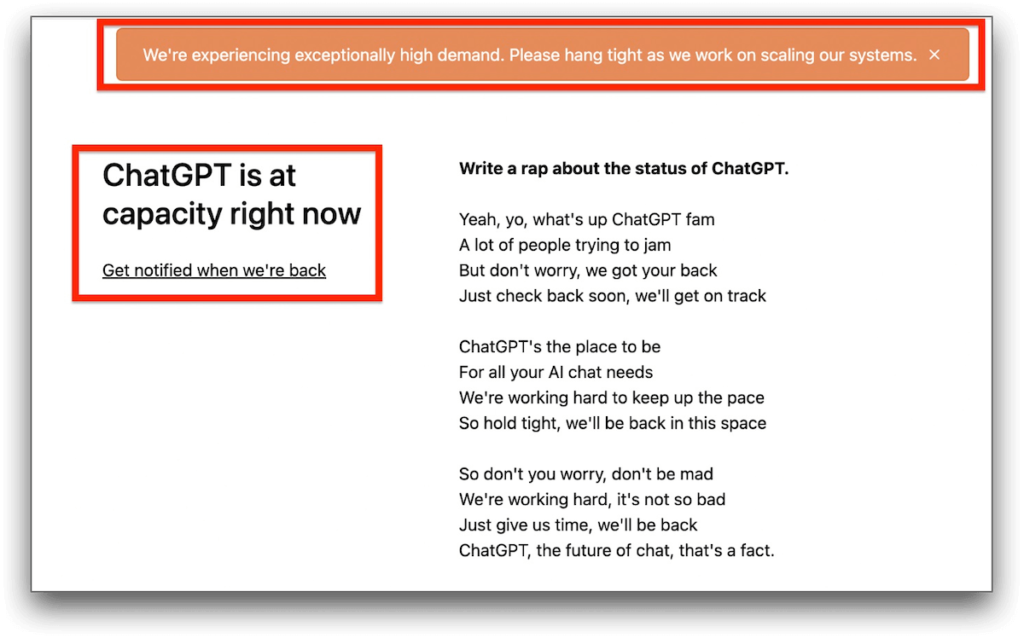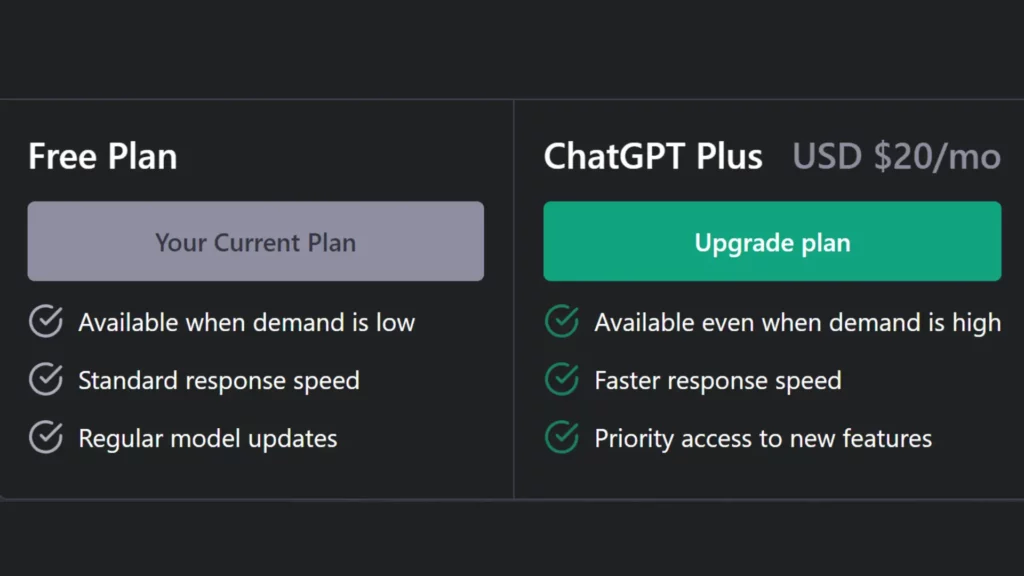
Table of Contents
Introduction
As the demand for AI-powered communication tools grows exponentially, OpenAI’s ChatGPT has become a popular choice among users. However, with the increasing demand comes the inevitable challenge of handling a large volume of user interactions. In this article, we will explore the current situation where “ChatGPT is at capacity right now” and provide insights into what this means, why it’s happening, and potential workarounds.
What is “ChatGPT is at capacity right now”?
When you hear the phrase “ChatGPT is at capacity right now,” it refers to a situation where the AI model, ChatGPT, is unable to process any more requests from users at a given moment. This occurs when the total number of users or interactions surpasses the system’s ability to handle them efficiently. In such cases, new users or requests are temporarily halted until the system can regain its stability.
Why is ChatGPT at capacity right now?
There are several reasons why Chat GPT might be at capacity right now. One primary factor is the growing popularity and adoption of AI-based chatbots and language models like Chat GPT. As more people rely on these technologies for various purposes, the sheer number of users can quickly overwhelm the system’s resources. Additionally, technical limitations, such as server capacity and processing power, can also contribute to the system being at capacity.
How do I access ChatGPT at capacity?
Unfortunately, when ChatGPT is at capacity, there isn’t a direct way to access the service. You may have to wait until the system returns to normal and can accommodate new requests. In some cases, OpenAI may prioritise access for users with paid subscriptions, like ChatGPT Plus, which could potentially grant you access even when the system is at capacity. However, there are no guarantees, and waiting is usually the only option.
How long does it take for ChatGPT to come back?
The time it takes for Chat GPT to return to normal functioning after being at capacity varies. It could be a matter of minutes, hours, or even longer, depending on the situation and the load on the system. OpenAI continually works to improve the system’s capacity and performance, so downtimes could potentially decrease over time.
What is the workaround for ChatGPT at capacity?
While there isn’t a direct workaround when ChatGPT is at capacity, you can consider the following strategies to maximize your chances of accessing the service:
- Opt for a subscription plan like ChatGPT Plus, which may have priority access during high-demand periods.
- Access the service during off-peak hours when there might be fewer users competing for system resources.
- Be patient and try accessing the service at regular intervals to check if the system has returned to normal functioning.
Solution for: ChatGPT is at capacity right now
Here are eight methods to address the “ChatGPT is at capacity right now” issue:
- Wait for a while: If you don’t need an immediate response, wait for 15-30 minutes and try again later. You can also opt for email notifications when the service is back.
- Use a VPN: A virtual private network (VPN) can help bypass the “at capacity” error by connecting you to a server with fewer users and less traffic.
- Try general tricks: Refresh the page, use ChatGPT in incognito mode, clear your browser’s cache, or restart your computer to potentially resolve the issue.
- Try ChatGPT Plus: Subscribing to ChatGPT Plus ($20/month) ensures faster response times and higher availability, making it a suitable choice for regular users.
- Re-login to your ChatGPT account: Logging out and back into your account may help bypass the “at capacity” error message.
- Use another ChatGPT account: If you have access to multiple ChatGPT accounts, try switching to a different one.
- Use a different OpenAI API: Explore other OpenAI APIs like GPT-4, GPT-3, DALL-E, or Codex if ChatGPT is at capacity.
- Try ChatGPT alternatives: If all else fails, consider using alternatives like Google’s Bard AI, Microsoft’s Bing ChatGPT, Baidu’s Ernie Bot, or ChatGPT Sidebar.
What is the meaning of ChatGPT?
Chat GPT stands for “Chat Generative Pre-trained Transformer,” which is an AI language model developed by OpenAI. It is designed to generate human-like responses in a conversational manner. The model is trained on a vast dataset of text, allowing it to understand context and respond to various queries, making it an ideal tool for tasks like chatbots, content generation, and more.
Does ChatGPT Plus have a limit?
ChatGPT Plus does have a limit, but it offers a higher usage allowance compared to the free version of Chat GPT. Subscribers of ChatGPT Plus enjoy faster response times, general access even during peak times, and priority access to new features and improvements. However, there is still a fair usage policy in place to ensure that the system resources are not overwhelmed by a single user.
Where is ChatGPT available?
Chat GPT is available globally, with users from around the world able to access the service through the OpenAI website or API. However, availability may vary depending on the user’s subscription type (free or ChatGPT Plus) and whether the system is at capacity.
Why is ChatGPT not loading?
There could be several reasons why Chat GPT is not loading, such as:
- The service is at capacity, and you may need to wait before accessing it.
- Technical issues on the OpenAI server side.
- Issues with your internet connection or browser.
Can ChatGPT be detected?
Yes, it is possible to detect if a text has been generated by Chat GPT or similar AI models. Researchers and developers have created tools that analyze the text patterns, language usage, and other factors to determine if it is AI-generated. However, as AI models improve, it may become increasingly challenging to differentiate between human-generated and AI-generated content.
Can we use ChatGPT for free?
Yes, you can use ChatGPT for free, but with certain limitations. Free users will experience slower response times and may not have access to the service during peak hours or when the system is at capacity. To enjoy faster response times, general access, and priority for new features, you can subscribe to ChatGPT Plus.
What is ChatGPT Plus?
ChatGPT Plus is a subscription plan offered by OpenAI that grants users additional benefits compared to the free version of ChatGPT. For a monthly fee, subscribers receive faster response times, general access to the service even during peak hours, and priority access to new features and improvements. This subscription plan helps support the free access availability for as many users as possible.
What is the difference between ChatGPT and Plus?

The main differences between ChatGPT and ChatGPT Plus are the response times, access during peak hours, and priority for new features. While both free and subscribed users can access ChatGPT’s core functionality, ChatGPT Plus subscribers benefit from faster response times, uninterrupted access even during high-demand periods, and priority access to any new features and improvements.
What is the question limit in ChatGPT?
The question limit in ChatGPT varies depending on the user’s subscription type. Free users have a limited number of tokens (the units representing chunks of text) they can use per month, while ChatGPT Plus subscribers have a higher token limit. However, both free and subscribed users must adhere to OpenAI’s fair usage policy to prevent system overloading.
Why is the chatbot always at capacity?
The chatbot may appear to be always at capacity due to the high demand for ChatGPT’s services and the growing popularity of AI-powered communication tools. Technical limitations, such as server capacity and processing power, can also contribute to the system reaching its capacity. OpenAI is continually working on improving the system’s capacity and performance to better handle user demand.
Who owns ChatGPT?
ChatGPT is owned by OpenAI, an artificial intelligence research lab consisting of the for-profit OpenAI LP and its parent company, the non-profit OpenAI Inc. OpenAI is dedicated to advancing AI technologies with a focus on ensuring that these advancements benefit humanity as a whole.
Who owns OpenAI?
OpenAI is owned by its parent organization, OpenAI Inc., which is a non-profit entity. It was founded by Elon Musk, Sam Altman, Greg Brockman, Ilya Sutskever, John Schulman, and Wojciech Zaremba in 2015. The organization’s mission is to develop safe and beneficial AI technologies for the betterment of humanity, with an emphasis on long-term safety and technical leadership.
Will GPT-4 be free?
There is no definitive information regarding the availability or pricing structure of GPT-4, as it has not been released yet. However, it is likely that OpenAI will continue to offer a tiered access model, similar to the current structure of ChatGPT, which provides both free access and subscription-based plans like ChatGPT Plus for improved features and access.
What are the uses of ChatGPT?
ChatGPT has a wide range of applications, including but not limited to:
- Chatbots: Providing human-like responses to user queries in customer support, personal assistants, and more.
- Content generation: Assisting in drafting articles, blog posts, social media updates, and other forms of written content.
- Language translation: Offering translations between various languages.
- Creative writing: Aiding writers with story ideas, plot development, and character creation.
- Summarization: Generating concise summaries of long documents or articles.
- Coding assistance: Providing suggestions and recommendations for code improvements and error resolution.
Conclusion
The increasing popularity of OpenAI’s ChatGPT has led to instances where the service reaches capacity, limiting access for users. Understanding the reasons behind this issue, as well as potential workarounds and the features of subscription plans like ChatGPT Plus, can help users navigate these challenges. As AI technologies continue to evolve, OpenAI remains committed to improving the capacity and performance of services like ChatGPT, ensuring that users can benefit from the powerful capabilities offered by AI-driven communication tools.